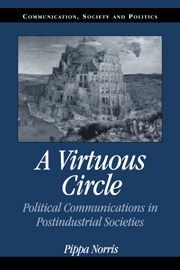Book contents
- Frontmatter
- Contents
- List of Tables
- List of Figures
- Preface
- PART I THE NEWS MEDIA AND CIVIC MALAISE
- 1 The News Media and Democracy
- 2 Evaluating Media Performance
- 3 Understanding Political Communications
- PART II TRENDS IN POLITICAL COMMUNICATIONS
- PART III THE IMPACT ON DEMOCRACY
- CONCLUSIONS
- Technical Appendix
- Notes
- Select Bibliography
- Author Index
- Subject Index
2 - Evaluating Media Performance
Published online by Cambridge University Press: 26 February 2010
- Frontmatter
- Contents
- List of Tables
- List of Figures
- Preface
- PART I THE NEWS MEDIA AND CIVIC MALAISE
- 1 The News Media and Democracy
- 2 Evaluating Media Performance
- 3 Understanding Political Communications
- PART II TRENDS IN POLITICAL COMMUNICATIONS
- PART III THE IMPACT ON DEMOCRACY
- CONCLUSIONS
- Technical Appendix
- Notes
- Select Bibliography
- Author Index
- Subject Index
Summary
Commentators often have suggested that newspapers or television should fulfill certain obligations, such as raising public awareness about AIDS, encouraging interest in international affairs, or stimulating community activism. Many believe that during election campaigns the news media have a particular responsibility to help strengthen democracy by providing political coverage that will educate the public about the major issues, inform citizens about the contenders for office, and mobilize people to turn out. If judged by those standards, the news media have largely failed in their democratic functions, media malaise theories suggest. Embedded in these claims are certain normative assumptions about what political coverage the news media should provide. But what are the appropriate standards for evaluating the roles of the news media?
This chapter starts with the theory of representative democracy developed by Joseph Schumpeter and Robert Dahl, based on the concepts of pluralistic competition, public participation, and civil and political rights. We then consider the benchmarks available to evaluate journalism that flow from this understanding. The strategy we use follows the idea of a democratic audit, developed to evaluate how institutions like elections, legislatures, and the judiciary work in any particular society. Our approach identifies three core political functions of the news media system - as a civic forum, as a mobilizing agent, and as a watchdog. Based on these functions, we develop more specific benchmarks, or a checklist, that can be used to audit the performance of the news media system in any democracy. Subsequent chapters go on to examine the evidence for media performances judged against these standards.
- Type
- Chapter
- Information
- A Virtuous CirclePolitical Communications in Postindustrial Societies, pp. 22 - 35Publisher: Cambridge University PressPrint publication year: 2000



